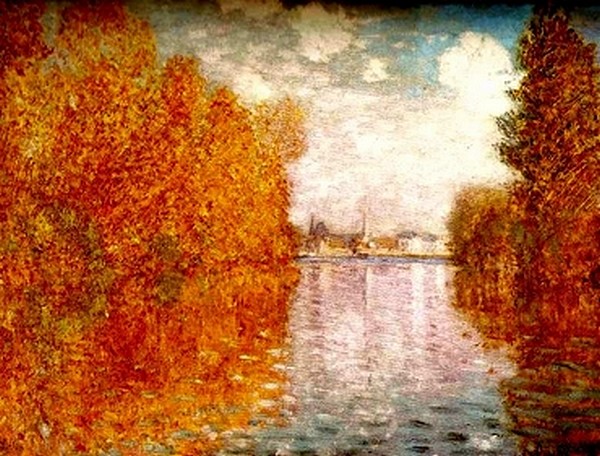
A few days ago, when leaving a concert at the Palau de la Música Catalana where we had heard the "Four last songs" by Strauss, a friend of mine asked me: when will you post September on you blog? No sooner said than done, September jumped up some posts in the queue and here it is. When we listened to Beim Schlafengehen, we focused more on the version than on the songs, now I have the opportunity to explain a few things about them.
In the spring of 1948, Richard Strauss and his wife Pauline lived in retirement in Switzerland. The composer was about to turn 84 years old, not much time had passed since the end of (in Strauss's words) "the most terrible period of human history," and he was still under suspicion of having been a collaborator. Months before, he had returned from a trip to England during which he had managed to rehabilitate his image with the help of friends like Thomas Beechan, and in June that year, he was exonerated in his denazification trial as innocent; in early 1949, he went back to his home in Garmisch-Partenkirchen, where he died on September 6th. It was during the months between the spring and autumn of 1948 when he wrote his last works, five lieder, although the last one, Malven, was kept secret by the soprano Maria Jeritza to whom it was dedicated, and anything was known about the song until she died in 1982.
The Vier letzte Lieder (Four last songs) are, regarding their composition date, Im Abendrot, Frühling, Beim Schlafengehen and September, which were completed in May, July, August and September, respectively. Im Abendrot is the only lieder composed from a poem by Joseph von Eichendorff. We don't know if Strauss planned to write some more songs from Eichendorff's poems but, if so, he changed his mind when his son sent him a volume of poetry by Hermann Hesse (who the composer met during his stay in Switzerland). He chose several poems and composed the three already mentioned songs. The Vier letzte Lieder are a farewell to a world that no longer existed and looked calmly to death, as a rest after a long and intense life.
As I said in a previous post about Strauss, he wrote only fifteen orchestral lieder and among them only the Vier letzte Lieder are programmed regularly; in fact, it is one of his most famous works. Although it was published posthumously, it is pretty sure that Strauss did mean to make a cycle with the four songs, perhaps he wanted to add a fifth one, Ruhe, meine Seele, which he composed 50 years ago and orchestrated that year 1948. His editor and friend, Ernst Roth, finally edited the cycle as we know it. Several sources also state that Strauss asked Kirsten Flagstad to premiere these songs and decide by herself who the conductor had to be. Indeed, Kirsten Flagstad premiered them on 22th May 1950 at the Royal Albert Hall in London, with the Philharmonia Orchestra conducted by Wilhelm Furtwängler. They didn't perform it in the order that Strauss had composed them but as follows: Beim Schlafengehen, September, Frühling and Im Abendrot. Finally, Roth published them in the order that are commonly performed: Frühling, September, Beim Schlafengehen and Im Abendrot.
My friend asked me September because it's her favourite; I told ther that mine was Beim Schlafengehen, but the truth is that I listen to them and all four are special. In September, Hesse paints a picture: autumn arrives, the cold rain wets the flowers and leaves fall from the trees. Summer gazes the scene and no longer recognizes its garden; it smiles while looking at the latest roses, it feels tired and drifts off. Strauss gave movement to the picture, we can listen to the falling leaves and the rain; the orchestra’s calm, and even its optimism, make us feel that September is not the end but the beginning of another life.
Vier letzte Lieder's premiere was broadcasted and the label Testament Records released the recording in 2007. We're listening to Kirsten Flagstad's September version because of its historical value. The truth is, though, that the quality is not that good, so we're listening to a second recording, the one of Soile Isokoski and the Rundfunk-Sinfonieorchester Berlin conducted by Marek Janowski.
Der Garten trauert,
kühl sinkt in die Blumen der Regen.
Der Sommer schauert
still seinem Ende entgegen.
Golden tropft Blatt um Blatt
nieder vom hohen Akazienbaum.
Sommer lächelt erstaunt und matt
in den sterbenden Gartentraum.
Lange noch bei den Rosen
bleibt er stehen, sehnt sich nach Ruh.
Langsam tut er die großen
müdgewordnen Augen zu.
the rain sinks coolly into the flowers.
Summer shudders
as it meets its end.
Leaf upon leaf drops golden
down from the lofty acacia.
Summer smiles, astonished and weak,
in the dying garden dream.
For a while still by the roses
it remains standing, yearning for peace.
Slowly it closes its large
eyes grown weary.
(Translation © by Emily Ezust, from the LiederNet Archive)












